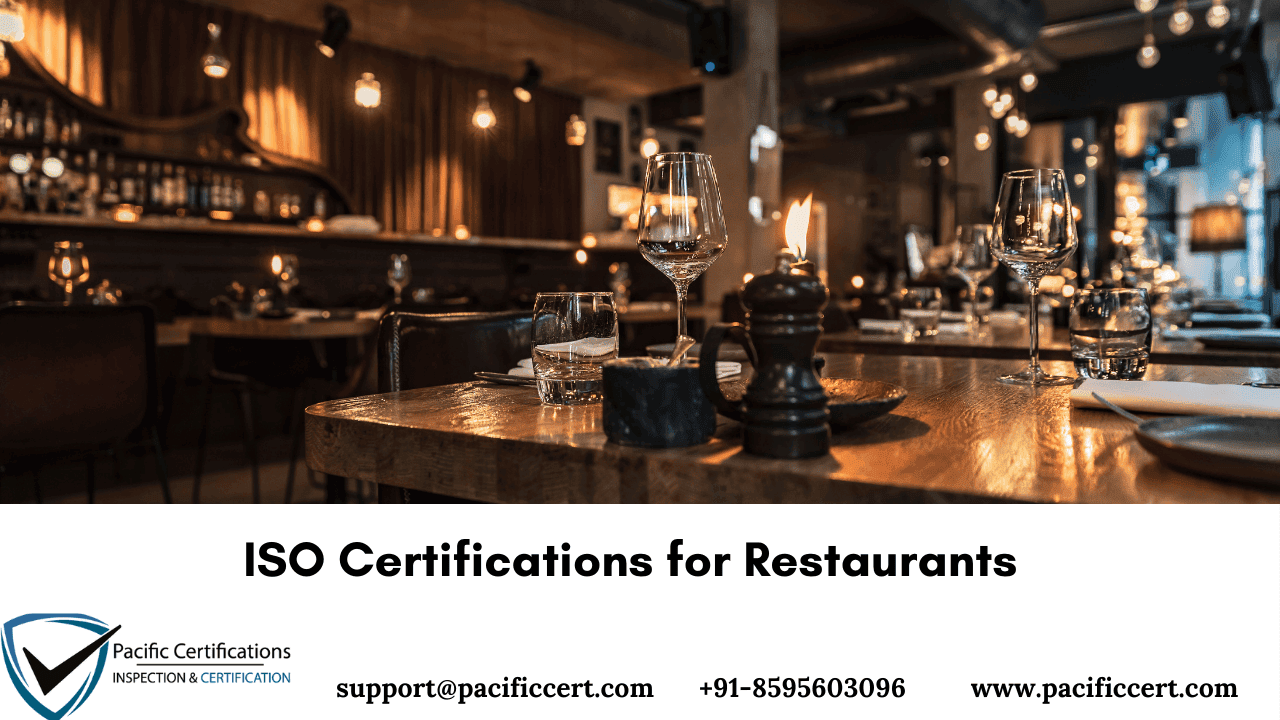ISO Certifications for Restaurants, Applicable Standards, Requirements and Benefits

Introduction
The restaurant industry operates in a hygiene-critical and compliance-driven environment where food safety, service consistency, staff safety, and regulatory compliance directly influence customer trust and business sustainability. Restaurants include standalone dining outlets, quick-service restaurants (QSRs), cloud kitchens, fine-dining establishments, hotel restaurants, franchise chains, catering units, and food courts serving diverse customer segments.
With rising consumer awareness, stricter food safety laws, increased inspections, digital ordering platforms, and intense online review culture, restaurants are under constant pressure to maintain consistent standards. Food contamination, hygiene lapses, unsafe working conditions, or poor service controls can quickly lead to legal penalties, closure notices, reputational damage, and revenue loss. ISO certifications provide internationally recognized management system frameworks that help restaurants standardize operations, control food safety risks, ensure staff and customer safety, and demonstrate professional governance to regulators, partners, and customers.
In the food service industry, trust is built not only on taste but on consistent quality, safety, and responsibility.
Applicable ISO standards for Restaurants
Below are the applicable ISO standards for Restaurants:
ISO 22000 - Food Safety Management System
ISO 22000 is the most critical standard for restaurants. It focuses on identifying food safety hazards, implementing hygiene and sanitation controls, managing suppliers, preventing contamination, and ensuring safe food preparation, storage, and service across kitchens, cloud kitchens, catering operations, and delivery models.
ISO 9001 - Quality Management System
ISO 9001 helps restaurants standardize service processes such as order handling, food preparation timelines, customer service, complaint resolution, supplier coordination, and internal performance monitoring. It supports consistent guest experience across shifts, outlets, and locations.
ISO 14001 - Environmental Management System
ISO 14001 certification helps ensure that your operations are environmentally responsible. This standard is all about reducing the environmental impact of a business.
ISO 45001 - Occupational Health and Safety Management System
Restaurant operations involve hazards such as hot surfaces, sharp tools, slips and falls, gas and electrical systems, chemical cleaning agents, and long working hours. ISO 45001 provides a structured framework to identify hazards, reduce workplace accidents, ensure legal compliance, and protect staff wellbeing.
ISO 27001:2022 - Information Security Management System
Restaurants increasingly rely on POS systems, online ordering platforms, mobile apps, loyalty programs, and digital payments. ISO/IEC 27001 ensures confidentiality, integrity, and protection of customer personal data, payment information, vendor contracts, and business records.
ISO 22301:2019 – Business Continuity Management Systems
Restaurants are vulnerable to disruptions such as equipment breakdowns, supply shortages, staff unavailability, power failures, or public health events. ISO 22301 ensures preparedness and recovery planning so essential restaurant operations can continue or resume quickly.
ISO 31000:2018 - Risk Management
ISO 31000 enables restaurant owners to systematically identify and manage risks related to food safety incidents, regulatory non-compliance, supplier failures, reputation damage, financial losses, and operational disruptions.
HACCP - Hazard Analysis and Critical Control Points
Part of ISO 22000, HACCP is widely used in the food industry, including restaurants, to ensure food safety. It focuses on identifying and controlling hazards in food production.
GMP - Good Manufacturing Practice
Similar to HACCP, GMP is not an ISO standard but is important for ensuring the safety and quality of food products in restaurants. It outlines best practices in food handling and preparation.
Click here to find out more applicable standards to your industry
What are the requirements of ISO Certifications for Restaurants?
To achieve an ISO certification, restaurants must build documented systems for quality, safety, and compliance, supported by training, monitoring, and continual review. Here are few of the requirements of ISO certifications for restaurants:
Define the scope of operations, including sourcing, preparation, storage, and service.
Establish policies for food safety, quality, environment, and workplace safety with management commitment.
Identify and assess risks such as food contamination, hygiene lapses, supply chain issues, and staff safety.
Implement documented processes for sourcing ingredients, kitchen hygiene, waste management, and customer service.
Train staff on safe food handling, hygiene protocols, customer care, and sustainability practices.
Maintain records of inspections, supplier checks, food safety audits, and customer feedback.
Monitor performance indicators such as customer satisfaction, safety incidents, and food safety test results.
Conduct internal audits and management reviews to verify compliance and drive improvements.
Tip: Restaurants should start with ISO 22000 or HACCP for food safety, then expand to ISO 9001 and ISO 14001 to improve service quality and sustainability.
For assistance in evaluating your restaurant operations against ISO requirements, contact [email protected].
What are the benefits of ISO Certifications for Restaurants?
Certification helps restaurants gain customer trust and operate more efficiently while building long-term resilience. Some of the key advantages include:
Consistent service quality, improving customer satisfaction and repeat business.
Higher food safety standards, minimizing contamination and foodborne illness risks.
Safer working conditions, protecting employees from accidents in kitchens and dining areas.
Lower environmental footprint through sustainable waste, energy, and water management.
Better reputation and stronger credibility with customers, suppliers, and regulators.
Easier compliance with food safety and labor regulations, reducing risk of penalties.
Increased competitiveness in attracting partnerships, franchises, and global customers.
A framework for continuous improvement that supports growth and innovation.
The restaurant and foodservice industry is projected to reach about USD 4.03 trillion in 2025, growing from USD 3.48 trillion in 2024, with a compound annual growth rate (CAGR) of nearly 7.8 % through 2032.- Restroworks. Consumers are emphasizing experience over price—64 % of full-service diners say their dining experience matters more than cost. Delivery and takeout have become cultural norms: around 75 % of restaurant traffic is now off-premise, driven by demand for speed and convenience.
Technology, personalization, and sustainability are reshaping how restaurants compete. AI and data analytics help tailor menus and promotions- restolabs.com. Meanwhile, consumer focus on climate, waste reduction, and ingredient traceability is pushing restaurants to adopt zero-waste cooking, eco-friendly sourcing, and sustainable packaging.
These shifts highlight why ISO certifications are increasingly valuable in the industry. ISO 22000 and HACCP help restaurants manage food safety risks in fast-moving delivery models.
Conclusion
In summary, ISO certifications can set your restaurant apart from competitors and attract customers who value quality. In summary, obtaining ISO certifications for your restaurant can provide numerous benefits, including improved quality and safety.
Contact Us
If you need assistance with ISO certification, feel free to contact us at Pacific Certifications at [email protected] for expert guidance and support in the certification process!
Author: Alina Ansari
Read more: Pacific Blogs

